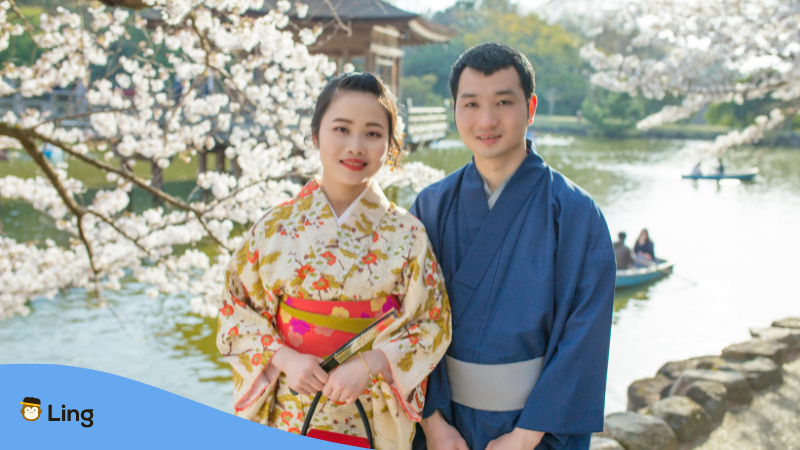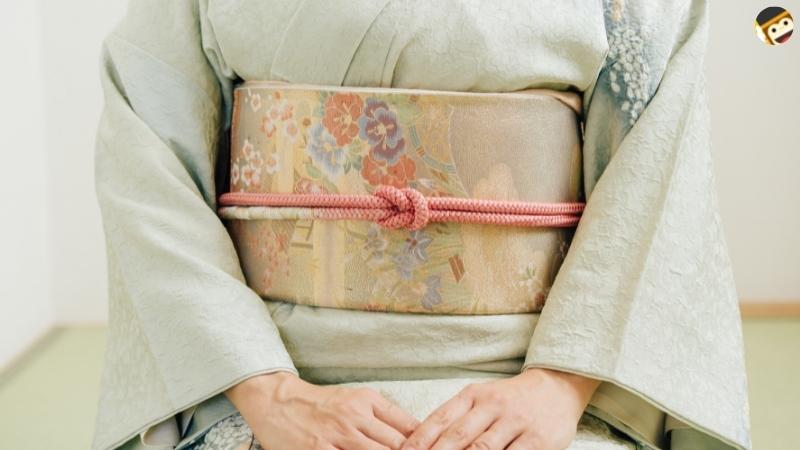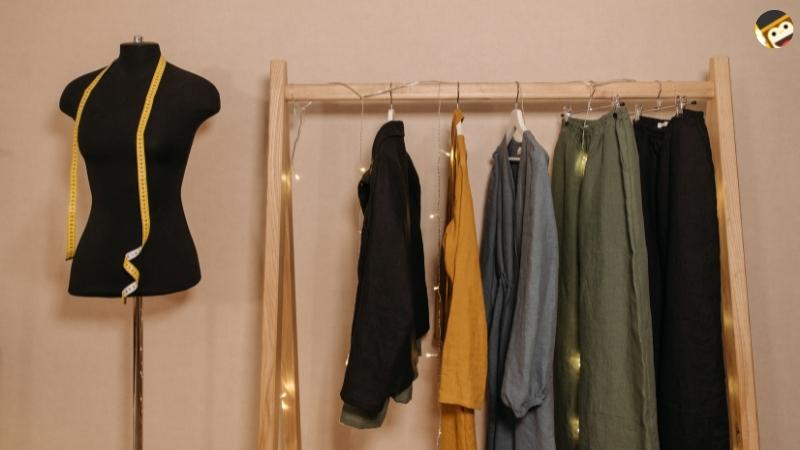The Japanese culture has influenced modern fashion to a large extent. Today we see that kimonos come in various shapes and styles and they are an indispensable part of summer clothing.
But is it only the kimono that we should appreciate in Japanese fashion? Absolutely not! There are many more beautiful and elegant clothing pieces belonging to Japanese culture. Let’s have a look at some of them in this blog post.
And right after that, you will learn about clothes in Japanese and plus a few Japanese phrases that can become handy.

Traditional Clothes In Japanese
First things first, I want to introduce you to traditional clothing in Japan briefly and then we can get to the Japanese words about modern clothing.
Clothing is still a unique part of Japanese culture. There are several different clothing types when we talk about traditional Japanese clothes. The most well-known traditional Japanese clothing is the kimono.
Japanese people used to wear kimonos before WWII in daily life. It is not the case today. However, they wear kimonos and other traditional clothes for special occasions such as ceremonies and festivals.

Kimono – 着物
Today, the kimono is only worn for formal and traditional events such as weddings, tea ceremonies, and festivals. There are different types of kimonos such as yukata 浴衣 and furisode 振袖. They are chosen appropriately according to your age and marital status.
The furisode 振袖 is a long-sleeved kimono that is worn by unmarried women. Also, the women’s kimono includes a wide belt called obi 帯 which is usually tied in a bow shape at the back.
Fun fact: Kimono literally means ”something to wear” in Japanese.

Haori & Hakama – 羽織と袴
Haori (羽織) is an overcoat that is worn on top of a kimono. And hakama 袴 are skirt-like pants worn with the kimono. They become a formal wedding outfit for the groom when they’re worn together in wedding ceremonies. They can also be worn in coming-of-age ceremonies in Japan.
The hakama was originally a garment for Japanese samurais and people who attend Shinto ceremonies.
Today, Japanese women can also wear haori and hakama, especially for university graduation ceremonies.

Happi & Hanten – 法被と半纏
Hanten (半纏) is short winter outerwear made with cotton padding to keep you warm in the cold weather. It is worn on top of the kimono and both men and women can wear it.
Happi (法被) is also a short coat similar to the hanten. The difference between them is that the happi is more casual than the hanten.
Today the happi is usually worn during Japanese festivals and they have printed kanji on their back that says matsuri 祭り which means ”festival” in Japanese. Also, they come with a matching headband.

Japanese Vocabulary For Essential Clothing
Are you a fan of Japanese fashion? Then, I’m sure you don’t want to return empty-handed from your Japan trip. As you know, there are many pretty – or should I say 可愛い (kawaii) – boutiques in Japan.
If your Japanese is not very good, you may have a difficult time communicating with the shop assistant or explaining to them what kind of clothes you want to buy in the Japanese clothes store (衣料品店 – iryōhinten). So, you can be more confident when shopping if you learn Japanese vocabulary about clothing.
You can see the Japanese translation written in kanji, katakana, and romaji in this Japanese word list.
Clothes – 服 (Fuku)
Footwear – 履物 (Hakimono)
| English | Kanji | Hiragana Katakana | Romaji | Pronunciation |
| Shoe | 靴 | くつ | Kutsu | |
| Boots | ブーツ | Bu-tsu | ||
| Socks | 靴下 | くつした | Kutsushita | |
| Sneakers | スニーカー | Suni-ka- | ||
| Slippers | スリッパ | Surippa | ||
| Sandals | サンダル | Sandaru | ||
| High Heeled Shoes | ハイヒール | Haihi-ru |
Accessories – 付属品 (Fuzokuhin)
Useful Japanese Words & Phrases For Clothing
- Long – 長い (Nagai)
- Short – 短い (Mijikai)
- Loose – ゆるい (Yurui)
- Tight – きつい (Kitsui)
- Soft – 柔らかい (Yawarakai)
- Oversize – 特大 (Tokudai)
- Pattern – パターン (Patān)
- Fabric – ファブリック (Faburikku)
- Comfortable – 快適 (Kaiteki)
- Casual clothes – カジュアルな服装 (Kajuaruna fukusō)
- Clothes hanger – ハンガー (Hangā)
- To wear clothes – 服を着る (Fuku wo kiru)
- To undress – 服を脱ぐ (Fuku wo nugu)
- To try on clothes – 服を試着する (Fuku wo shichaku suru)
- To wash the clothes – 服を洗う (Fuku wo arau)
- How much is this dress? – このドレスはいくらですか? (Kono doresu wa ikuradesu ka?)
- I want the medium size. – ミディアムサイズが欲しいです。(Midiamu saizu ga hoshīdesu.)
- Does this shirt come in black color? – このシャツの色は黒ですか? (Kono shatsu no iro wa kurodesu ka?)
- I would like to return this. – これは返品したいです。(Kore wa henpin shitaidesu.)
- This skirt has a defect. – このスカートには欠陥があります。(Kono sukāto ni wa kekkan ga arimasu.)
- These pants are so cozy. – これらのパンツはとても快適です。(Korera no pantsu wa totemo kaitekidesu.)

Learn Japanese With Ling!
If you want to learn Japanese or any of the other 60+ languages offered in the app, then you should try the Ling App!
Ling is a language learning app designed to help all learners as they venture out on their language learning journeys. With so many engaging activities to choose from, such as writing and listening exercises, mini-games, quick quizzes, and an AI chatbot to converse with, the Ling App is the perfect all-in-one language learning resource.
Also, don’t forget to visit our Japanese blog weekly to learn more about the Japanese language and culture!
You can find everything you could ever need in this app to master all 4 language skills. Even better, you can try the app out for free today by downloading it from the App Store or Play Store.
Start learning the Japanese language or another new language by downloading the Ling App today!


























